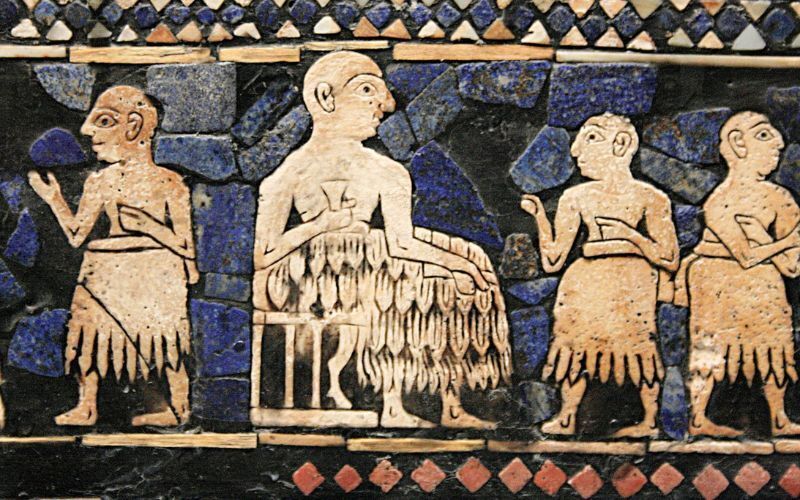Scenes of daily life from Sumer
1,000,000 BC to 10,000 BCE: Humans find that cooperative hunting works better. Small, genetically similar clans who use the golden rule to promote cooperation and sharing have a better chance to survive.
1800 BCE: Egypt's "Eloquent peasant" story has been said to have the earliest known golden-rule saying: "Do to the doer to cause that he do." But the translation is disputed and it takes much stretching to see this as the golden rule.
1450 BC to 450 BCE: The Jewish Bible has golden-rule like passages, including: "Don't oppress a foreigner, for you well know how it feels to be a foreigner, since you were foreigners yourselves in the land of Egypt" (Exodus 23:9) and "Love your neighbor as yourself" (Leviticus 19:18).
700 BCE: In Homer's Odyssey, goddess Calypso tells Odysseus: "I'll be as careful for you as I'd be for myself in like need. I know what is fair and right."
624-546 BCE: First philosopher Thales, when asked how to live virtuously, reportedly replies (according to the unreliable Diogenes c. 225 AD): "By never doing ourselves what we blame in others." A similar saying is attributed to Thales's contemporary, Pittacus of Mytilene.
563-483 BCE: Buddha in India teaches compassion and shunning unhealthy desires. His golden rule says: "There is nothing dearer to man than himself; therefore, as it is the same thing that is dear to you and to others, hurt not others with what pains yourself" (Dhammapada, Northern Canon, 5:18).
551-479 BCE: Confucius sums up his teaching as: "Don't do to others what you don't want them to do to you." (Analects 15:23)
522 BCE: Maeandrius of Samos (in Greece), taking over from an evil tyrant, says (according to the historian Herodotus c. 440 BC, in his Histories 3.142): "What I condemn in another I will, if I may, avoid myself." Xerxes of Persia c. 485 BC said something similar (Histories 7.136).
500 BCE: Jainism, a religion of India that promotes non-violence, compassion, and the sacredness of life, teaches the golden rule: "A monk should treat all beings as he himself would be treated." (Jaina Sutras, Sutrakritanga, bk. 1, 10:1-3)
500 BCE: Taoist Laozi says: "To those who are good to me, I am good; and to those who are not good to me, I am also good; and thus all get to receive good." (Tao Te Ching 49) A later work says: "Regard your neighbor's gain as your gain and your neighbor's loss as your loss." (T'ai-Shang Kan-Ying P'ien)
500 BCE: Zoroaster in Persia teaches the golden rule: "That character is best that doesn't do to another what isn't good for itself" and "Don't do to others what isn't good for you."
479-438 BCE: Mo Tzu in China teaches the golden rule: "Universal love is to regard another's state as one's own. A person of universal love will take care of his friend as he does of himself, and take care of his friend's parents as his own. So when he finds his friend hungry he will feed him, and when he finds him cold he will clothe him." (Book of Mozi, ch. 4)
440 BCE: Socrates (c. 470-399 BC) and later Plato (c. 428-347 BC) begin the classical era of Greek philosophy. The golden rule, while not prominent in their thinking, sometimes leaves a trace. As Socrates considers whether to escape from jail, he imagines himself in the place of the state, who would be harmed (Crito). And Plato says: "I'd have no one touch my property, if I can help it, or disturb it without consent on my part; if I'm a man of reason, I must treat the property of others the same way" (Laws). (Wattles 1996: 32-6)
436-338 BCE: Socrates in Greece teaches the golden rule as promoting self-interest (you do unto others so that they'll do unto you). He says: "Don't do to others what angers you when you experience it from others." The golden rule then becomes common, in positive and negative forms, in Greco-Roman culture, in Sextus, Demosthenes, Xenophon, Cassius Dio, Diogenes Laertius, Ovid, and others. The golden rule has less impact on Socrates, Plato, Aristotle, and early Stoics. (Meier 2009: 553f)
400 BCE: Hinduism has positive and negative golden rules: "One who regards all creatures as his own self, and behaves towards them as towards his own self attains happiness. One should never do to another what one regards as hurtful to one's own self. This, in brief, is the rule of righteousness. In happiness and misery, in the agreeable and the disagreeable, one should judge effects as if they came to one's own self." (Mahabharata bk. 13: Anusasana Parva, §113)
384-322 BCE: Aristotle says: "As the virtuous man is to himself, he is to his friend also, for his friend is another self" (Nicomachean Ethics 9:9). Diogenes Laertius (c. 225 AD) reports Aristotle as saying that we should behave to our friends as we wish our friends to behave to us.
372-289 BCE: Mencius, Confucius's follower, says (Works bk. 7, A:4): "Try your best to treat others as you would wish to be treated yourself, and you will find that this is the shortest way to benevolence."
300 BCE: Sextus the Pythagorean in his Sentences expresses the golden rule positively and negatively: "As you wish your neighbors to treat you, so treat them. What you censure, do not do." (Meier 2009: 554 & 628)
150 BCE: Various Jewish sources have golden-rule sayings. Tobit 4:16 says "See that you never do to another what you'd hate to have done to yourself." Sirach 31:15 says "Judge the needs of your guest by your own." And the Letter of Aristeas (see Meier 2009: 553f) says "Insofar as you [the king] do not wish evils to come to you, but to partake of every blessing, [it would be wise] if you did this with your subjects."


